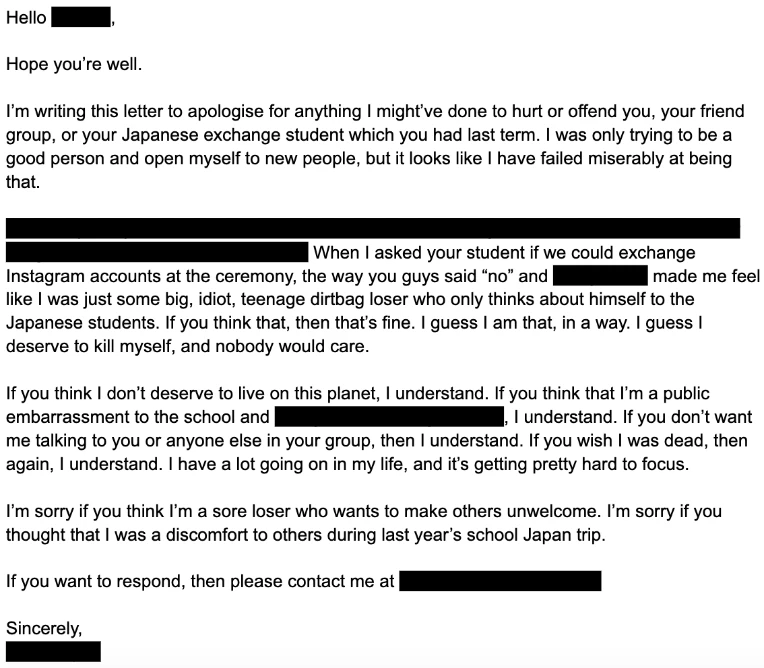Recently, there's been a lot going on with my life and mental health, and it's been getting hard to focus on stuff. Especially at school.
About a couple months ago, we had Japanese exchange students over. I decided if one of them wanted to exchange Instagram accounts. They didn't want to.
I felt like crap. I felt like that I did something to offend someone. So, I sent the student who hosted them an apology letter, explaining my true feelings, and what my issues were.

The student's reaction was... Well, it shocked me. They felt so upset by what I had sent them, they apparently had to be sent home early.
What have I done?
I hope as the days go on and on, and time passes forward, this student starts to feel better. I hope we can all achieve world peace someday, and work together for the future we deserve.
Yatsufusa
I cannot give you a "definitive answer", but I know a lot about Japan. I'll space my statements out a little, so they are easier to process.
Let me start by saying: They might not 'have' Instagram accounts. I don't have one either. Because Instagram is a site with a ton of fundamental issues...
'From how you describe the situation', you were basically strangers. Why would anyone trade contact info with a stranger?
Your letter also makes you sound overly dramatic, pretty entitled and... the way you phrased it, it sounded as if, from your own perspective, you were offering them some kind of "favor" by exchanging contact info...
Japanese school/university life is _brutal_! I don't know about Australian schools, but most European schools (including UK) and US schools are a _joke_, compared to what they go though. And those who "underperform" too much under the "expected results" will essentially end up as replaceable office drones - which most schools line their pupils up to become anyway. The social pressure from peers and parents can not be underestimated either. Suicide rates at that age are _through_the_roof_...
So yeah: I can imagine that the students who read your letter either were genuinely "upset" or saw an opportunity to escape that environment for a few hours. I do not know them, so I cannot tell you 'exactly' what went down.
The best advice I could give you in this regard would be to send a letter with a formal, neutral greeting, "I am sorry that my last letter has upset you and assure you that there will be no further contact from me." and a "Sincerely, [YourNameHere]". That way they at least have no need to feeling anxious about any future correspondence.
There are probably even better ways to phrase this, but unless you can talk to a genuine Japanese person to convey what I just said 'in Japanese', that "one-liner" letter is probably your best option. (Online translation would not do. There's more to a language than just using the right words.)